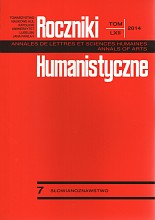Мифологемы „святость” и „страстность” в женском и мужском началах (роман Ивана Шмелева Пути небесные)
Mythologems “holiness” and “passion” as a feminine and masculine element (Ivan Shmelyov’s novel The heavenly ways)
Author(s): Zoja KucaSubject(s): Literary Texts
Published by: Towarzystwo Naukowe KUL & Katolicki Uniwersytet Lubelski Jana Pawła II
Keywords: Holiness; passion; character; feelings; temptations; humility
Summary/Abstract: The present article is devoted to analysis of the mythologems “holiness” and “passion” on the example of the feminine and masculine elements in Ivan Shmelyov’s novel The Heavenly Ways. Passion is shown as a binary opposition to holiness. Hence, holiness is understood, among others, as perfection, a moral virtue achieved by a man in the course of his personal development, and passion – as a state of strong and irresistible emotion directed at another person. In the case of the main protagonist of the novel this way leads from holiness to passion, which appears at the moment when a masculine element appears; on the contrary, the male hero who is characterized by passion, at adefinite moment, owing to a relation with the main female protagonist, becomes a religious person.
Journal: Roczniki Humanistyczne
- Issue Year: 62/2014
- Issue No: 07
- Page Range: 131-145
- Page Count: 15
- Language: Russian

